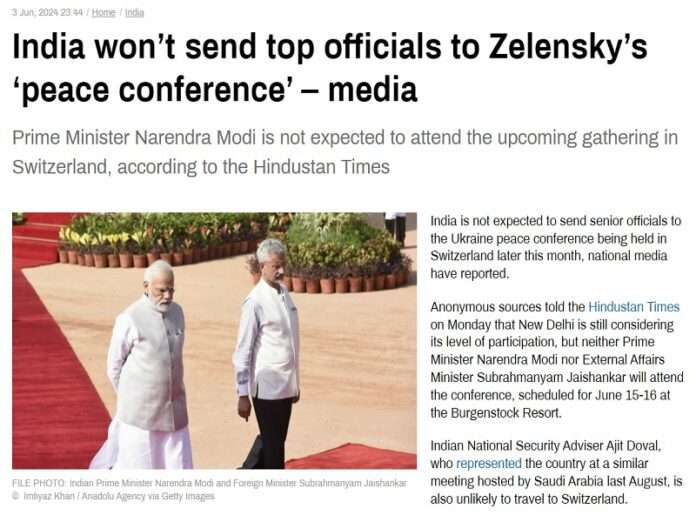Kremlin spokesman Dmitry Peskov addressed India’s planned low-level representation at the upcoming Swiss “peace talks”, which Prime Minister Narendra Modi previously said is motivated by his country’s interest in ensuring that the Global South has a say in these discussions. Former President and incumbent Deputy Chair of the Security Council Dmitry Medvedev tweeted that those who attend are taking Kiev’s side over Moscow’s, however, hence why Peskov was asked to clarify the Kremlin’s stance.
In the latter’s words, “This is not an issue for President Putin to discuss with his partners. Many serious states have expressed their firm belief in the futility of discussing the Ukrainian crisis without Russia’s participation. From the point of view of cost and effectiveness, this will be an empty event. It is the sovereign decision of each country whether or not to participate in an empty event.” His statement on this sensitive subject will now be interpreted in order to discern its deeper meanings.
For starters, President Putin doesn’t share Medvedev’s zero-sum view about non-Western participants like India supposedly taking Kiev’s side over Moscow’s by attending, hence why Peskov said that he didn’t discus this with Prime Minister Modi. That’s a relief for those who were worried that the former leader was speaking on the current one’s behalf in his earlier cited tweet and not just expressing himself in a personal capacity yet again.
Nevertheless, it’s clear that Russia doesn’t look positively upon those of its non-Western partners who decide to attend despite reaffirming that it’s their sovereign decision. This is intuited by what Peskov said about “many serious states’” opinions towards this upcoming event. Seeing as how China was the first major country to declare that it won’t participate in any form, a reading between the lines suggests that he’s comparing its position to India’s and drawing conclusions about their leaders’ judgement as a result.
It’s here where the reader should be reminded about the existence of Russia’s pro-BRI policymaking faction, which they can refreshen their memory about here, here, and here or learn about for the first time if they aren’t already aware. In brief, this group believes that a return to Sino-US bi-multipolarity is inevitable so Russia should accelerate China’s superpower trajectory as much and as soon as possible, while the balancing faction considers India a counterweight to disproportionate dependence on China.
Accordingly, that second group believes that Russia should continue multi-aligning between those two Asian Great Powers with a view towards accelerating tri-multipolarity processes that could then give way to complex multipolarity sometime later in the future. The balancing faction is against saying or doing anything that could even inadvertently offend India and thus risk empowering its pro-US policymaking faction, which might promulgate a full-fledged pivot that then makes bi-multipolarity inevitable.
This background is essential to understanding the subtle jab that Peskov just made against India by implying that Prime Minister Modi isn’t wise enough to realize that he’s wasting his diplomats’ time by dispatching low-level ones to the Swiss “peace talks”. The close friendship between the Russian and Indian leaders suggests that Peskov put his own personal spin on the matter, likely due to what’s at least his subconscious support of the pro-BRI faction, and that President Putin doesn’t share this view.
It’s important to clarify what he said in order to avoid empowering India’s pro-US faction, which could spin his words as his boss’ in order to convince Prime Minister Modi into somewhat distancing India from Russia during his third term in exchange for relief from US pressure. This plot won’t succeed in full, but it doesn’t mean that it won’t be attempted either, and even only a partial success in reshaping some policymakers’ perceptions of Russia through this means would still be a victory for this faction.








